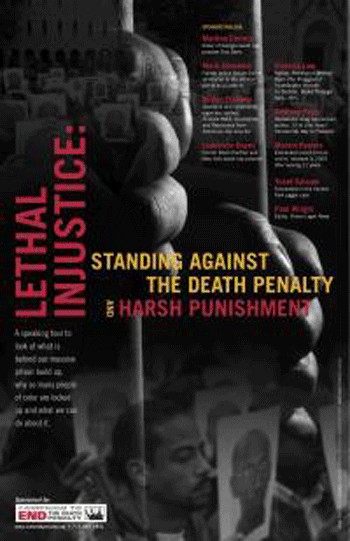Advocacy group targets death penalty

Courtesy Photo / laprogressive.com A lecture on the death penalty was held in the DeVos Center this past Wednesday, March 30.
Apr 3, 2011
Standing up against the issues in the criminal justice system, Amnesty International, Students Advocating Freedom Equality (S.A.F.E) and the Nouveaux Socialists united to discuss the lives of prisoners.
Three speakers addressed students about “Lethal Injustice” on Wednesday in the Loosemore Auditorium,
Victoria Law, author of the book “Resistance Behind Bars: The Struggles of Incarcerated Women,” opened the presentation by discussing the Attica and August rebellions.
Law said although most people have heard of the Attica uprising, they are unaware of Carole Crooks, who work tirelessly to improve female inmate’s conditions. An inmate herself, she became the focus of prison guard punishment, which led to the August rebellion of 1974.
“Women around her protested and held seven guards hostage,” Law said. “If it were not for remembering these uprisings, we’re not remembering the less visible social issues.”
Law spoke about sexual abuse of women prisoners and the disproportionate number of women of color imprisoned.
“This isn’t because they are committing more crimes but because of racism and racial profiling,” she said. “Also Michigan prisons from 1993 to 1996 had a high pervasive number of sexual assaults.”
She said the uprisings paved the way for Michigan legislation that prohibits male guards from entering dressing areas or checking women.
Mark Clements, a former torture victim who was sentenced to life in prison without parole as a juvenile, recounted the events that led to his imprisonment.
“They painted me as a monster,” he said. “The facts were ignored because I was poor. Color was an issue back then. Now it’s economic warfare. Now the prisons are filling up with all races.”
Mark Clements was 16 years old when he became a victim of routine round-ups by police officers under the command of John Burge. The activities of the police went unchecked for more than 20 years in the Chicago area, which Clements said cost him 27 years of his life.
“What most people fail to realize is that criminal justice system plays unfair,” he said. “If you’re poor and commit a serious crime, you’re going to prison. We believe in the criminal justice system and the law. We’re a nation of people who allow children to go prison for life.”
Clements was released in August and Burge has been sentenced to four years of prison for his crimes, but Clements wonders why it took $3.5 million to free him.
“A lot of people don’t care until they become a victim of the criminal justice system,” he added. “All it took was adults to own up to the responsibility that they failed a kid. Our society has lost its love for people.”
Clements used his closing to speak for death row inmate Troy Davis, who was convicted of the 1989 murder of Mark MacPhail, a Savannah, Ga., police officer. Davis’ case has garnered attention and defense from Amnesty International and has become a poster case for anti-death penalty advocates.
“Everyone in this room can make a difference,” Clements said. “If we don’t do our duty, how is the criminal justice system supposed to do its duty?”
Randi Jones, member of the International Campaign to End the Death Penalty, has spent years fighting the Texas death penalty. Jones talked about the duties of citizens.
“It takes grassroots efforts mixed with educational events and agitation from common folks such as you,” Jones said. “The injustice of the death row penalty is bigger than Troy Davis. What ordinary people like you and I do will determine the end of the law.”
Jones’ went on to elaborate on the larger issues of the death penalty and how they are all connected.
“We want education instead of prisons,” Clements said. “Health care, housing, after-school programs and jobs – those are the things that will lower the incarceration rate. We have to fight for what we want, for the right priorities.”
Fermin Valles, S.A.F.E president, said during the economic crisis, now is the time to for regular people to come out to debate, rethink and discuss the social and economic relations that exist within the system.
“As a student, we need to ask ourselves why are our state leaders are thrusting more funding into corrections rather than education,” Valles said. “The ideal is that people of all colors are facing a tax – one way to pit one against each other is through crime. The argument for the death penalty avoids the institutional problem at its core.”























